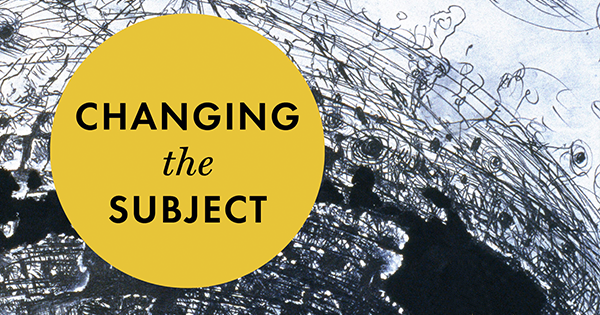Changing the Subject
An excerpt from Sven Birkerts’s latest book about art in the Internet age

Five years ago, Sven Birkerts wrote an essay for us about what it means to read books in a digital age. His latest book, Changing the Subject, goes even further to ask what it means to be an individual in a world that extols the virtues of crowdsourcing, crowdfunding, Google, the cloud—and, perhaps, the hive mind. As the vast holdings of our libraries become increasingly digitized, how will the roadmaps to knowledge change? Will the opaque algorithms of the search engine determine what we discover? Is knowledge doomed to become simply a catalog of information? Does the expert, the academic, or the author have any role in contemporary society? Read a brief excerpt from one of the essays in the book, “On or About,” which takes these questions as a starting point.
Consider the rapid expansion of Wikipedia … The honey of knowledge gathered by the far-flung swarm. It is a concrete realization of a decentralized, nonhierarchical model, a pioneer instance of an all-inclusive one-stop source for knowledge that was hitherto scattered among innumerable texts, and deemed the province of its myriad anointed authorities.
Again, what could be wrong with a communally generated compendium of knowledge—provided that it is knowledge and not unverifiable hearsay? From one perspective … nothing at all. It seems a stirring instance of people working together, pyramid building but with no taskmaster and no pharaoh. And it could be viewed as a kind of apotheosis of human progress. But for those foot draggers among us who worry about the fate of the individual, the idea of the individual—who get stuck on the adjective human in human progress and who believe systems and selves to be opposing terms—it can be seen as a further migration toward the groupthink ethos.
Information, then, ideas, references—anything we used to go to separate books for, and therefore understood as the product of individual insight, scholarship, and labor—more and more all this seems to come at us from a single neutral omnipotent source. How can this not threaten the idea of authorship and completely undermine the old understanding that knowledge is not a unilateral absolute, but an intricately worked accumulation, a structure comprising one stone laid upon the next?
Digital consolidation, along with the uniformity of the procedures of access, works aggressively against the former system of contexts. The picture of information that we derived from the idea of discrete books gives way to the picture of information as something derived from a glowing terminal. And if we lose nothing in terms of access to information from this digital centralization, we do begin to forget what the production of knowledge is really about. We become like children who “forget,” or maybe have never even learned, that milk comes from cows—imagining it somehow originates in the cartons Mother buys at the store.
Sven Birkerts, excerpt from “On or About” from Changing the Subject. Copyright © 2015 by Sven Birkerts. Reprinted with the permission of Graywolf Press, Minneapolis, Minnesota, www.graywolfpress.org.

